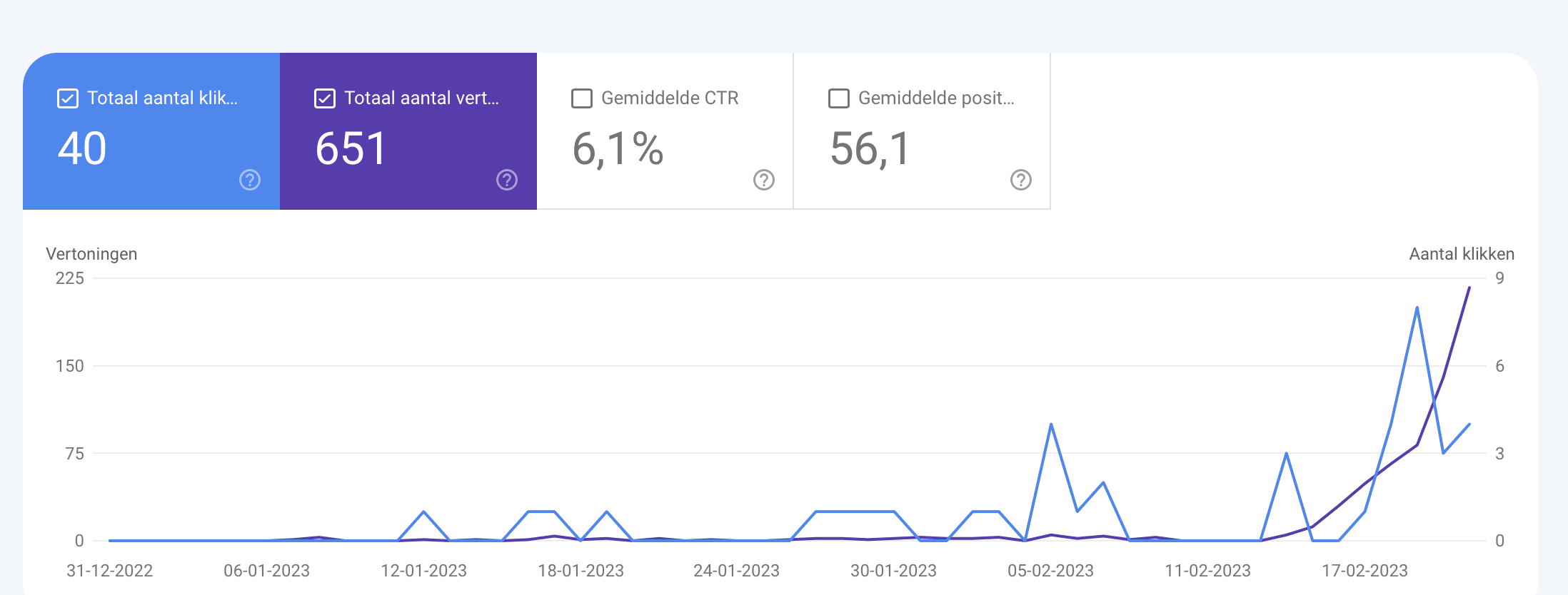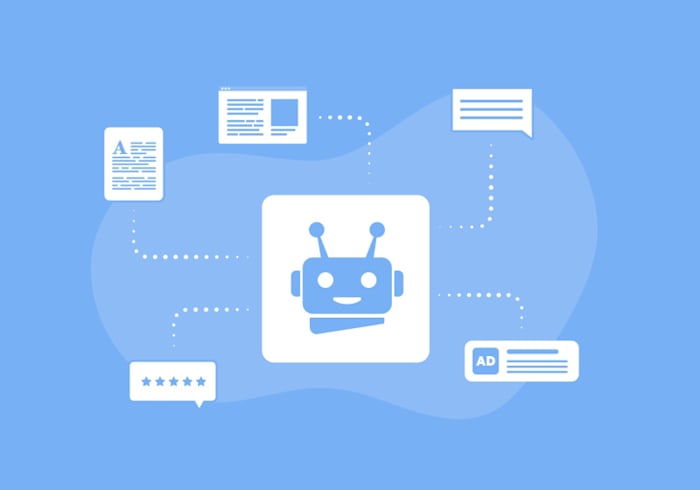How small businesses are using AI tools to fuel strategic growth
AI in content marketing is here to stay. Learn how to use AI tools to unlock creativity, speed up your content workflow, and fuel strategic business growth.
 March 14, 2023
March 14, 2023 16 minute reading
16 minute reading
最frustrati之一ng parts of content marketing is producing high-quality content, consistently and cost effectively.
A report by Casted shows that content marketers spend anaverage of 33 hours(about 82% of their time) weekly on content creation tasks:keyword research, topic selection,SEO optimization, promotion, distribution, and analysis. This leaves only seven hours for other crucial responsibilities, like determining strategy and managing the company brand.
So, how do you possibly manage all these responsibilities without exhausting yourself andstillhave time to grow your business? By usingartificial intelligence(AI) tools.
This guide covers what AI in content marketing actually is, its benefits, and how to use AI tools to fuel strategic business growth.
What is AI in content marketing?
AI in content marketinginvolves leveraging AI tools to create personalized content, boost engagement, and gain helpful insights that improve your marketing return on investment (ROI).

Source:Unsplash
Given the novelty of AI tools, using them for content marketing still seems cloudy for some. But the reality is, more than80% of industry expertsare using AI technology in their online marketing activities.
And why wouldn’t they?
Google, Amazon, Netflix, and other popular brands use AI systems in their products to enhance every step of the customer journey.
AI tools—which were previously available to enterprise-level companies—are now more accessible and affordable for all types and sizes of businesses. So you canuse AI at every stage of your content marketing strategyto improve performance and give your small business a competitive edge.
Take, for example, Interactive Investor—an online investment platform that enables retail investors to make confident and informed investment decisions.
The company’s marketing team wanted to use paid search to improve new customer acquisition and increase existing account sign-ups. Afterenlisting an AI toolthat improves digital advertising effectiveness, they got:
A well-optimized PPC campaign
About 10,000 different text ads
286% increase in keywords
Significant reduction in CPA and increase in new accounts
89% share of voice across the top 10 branded terms
Decreased bounce rate
They also uncovered an opportunity to develop advertising creatives to expand connections and deepen relationships with their existing customers.
AI tools and content marketing are a match made in heaven—one you can leverage to fuel strategic business growth. But, how exactly can it help your small business?
How does AI in content marketing help small businesses?
While content marketing is a good way for you to reach your audiences, it takes a significant effort to produce it. Your content teams have many job demands, which can become overwhelming.
Implementing AI in content marketing can benefit your small business by:
Revealing online search intent:Research tools backed by AI identify patterns in your audience’s online behaviors. Then they conduct more sophisticated analyses that discover and reveal online search intent. That way, you can quickly uncover search intent—not just keywords—to build a content strategy around the audience’s “why” to trigger engagement and conversion.
Boosting creativity:AI programs can help you build content frameworks fast, instead of wasting hours planning, organizing, and creating them using conventional methods. These tools can generate topics, briefs, outlines, and content suggestions, giving your content team fresh ideas while supercharging their productivity.
Providing valuable customer insights:AI tools collect key insights about your target audience and customers, including where they are on their customer journey. For instance, you can get demographic, engagement, and behavioral data to inform your campaign strategy, customer segmentation, and content creation.
Boosting marketing ROI:With an AI-enhanced workflow, you save time and money and get data-driven recommendations on what content topics, assets, or formats work best. You’ll also know when the market will pivot so you can adjust/shift your priorities, leading to a better marketing ROI.
Producing personalized content:By leveraging AI in your content marketing efforts, you can create customized content like targeted ads, customized emails, or interactive quizzes that engage your audience. That way, you can enhance connections and relationships with customers, improve the customer experience, and increase loyalty.
Minimizing human mistakes:Humans are prone to making mistakes, some of which can introduce risk and negatively impact your content marketing results. AI can reduce such errors so you can get more done without human involvement. For instance, you can use an AI proofreading tool to read over your content for annoying little details a human copy editor may not see.
Improving employee productivity and workflow efficiency:With AI tools handling the mundane, repetitive tasks in the background, your content team can focus on more strategic, human-centric work like strategy, writing, design, or management. For instance, AI can automate the who, when, where, and what of sending an email or SMS messages.
减少不当的风险a management and quality:You need the right data to learn about your audience. If your team enters data wrongly, manages it poorly, or stores it improperly, it can be useless for decision-making. AI can reduce these risks by automating data entry and analysis, giving you quality, valid data you can confidently use to create relevant, valuable, and effective content marketing campaigns.
Scaling traffic quickly and efficiently:AI-powered analytics can offer customer preference and behavioral insights that can inform your future content strategies. You can also scale your site traffic using AI-powered tools in SEO optimization to discover the best keywords and phrases to target in your campaigns or to identify quality backlinks for better site visibility.
"AI helped us achieve our content marketing goals by creating engaging content relevant to our audience and identifying areas to improve our marketing strategy and tactics,“says Abbas Moledina, co-founder ofYouMakr. "Through AI, we've been able to grow our site traffic by 50% to 90,000+ users and identify and focus our efforts on topics that generate the most engagement."
Without the right AI tools in your content marketing war chest, it’s difficult to realize all these benefits.
What types of AI tools are available for content marketing?
There are various AI tools to support your content marketing strategy and business growth. But to take advantage, you must know which ones to use.
Below are a few AI tools with the greatest potential to create value and drive impact for your content marketing processes.
Audience research tools
Before creating content, you need to know your target audience—who you want to address and reach by speaking to their wants and needs. This includes buyers and potential buyers (people who interact with your brand even before they make a purchase).
Have a clear idea of their priorities, preferences, and challenges. Craft buyer personas based on your audience research and knowledge, then choose one or two audience segments to write for.
For instance, Lululemon—a Canadian athleisure wear company—targets generally affluent, tech-savvy women and men who are:
In their mid-teens to mid-thirties
Largely fitness enthusiasts and value a fit and active lifestyle and work-life balance
Invested in their stylish and health-conscious self-image
The company uses this information to create content that connects with their ideal customer persona while appealing to their beliefs, thoughts, and behaviors.

Source:Lululemon
From Casted's report, content marketers spend 33 hours weekly on content creation. This leaves them with a measly seven hours to complete other important tasks.
Then throw in conducting customer and market research—like what Lululemon did to develop its buyer personas—and it eats up an additional 23% of the remaining hours in their workweek.
AI tools likeDelveorCrawlQ可以帮助你了解你的买家和数字吗ers. Rather than spend time gathering data from various sources, these tools use your site’s Google Analytics data to auto-generate segment-wise, data-driven buyer personas in minutes.
You save time, money, and effort for your team, freeing them up to focus on other aspects of the content marketing process. Plus, you get direction on the content you create for your ideal customers and how to assist them when they’re ready to take action.
Content planning tools
An effective content plan or calendar is critical to your content strategy. You can use it to prioritize tasks, organize your content creation, publish, distribute, and track progress.
The main tasks here include:
Selecting topics: Find relevant topics to cover based on your audience and competitive research insights.
Building topic clusters: Organize your content in groups within similar themes to help you build authority on a certain topic.
Conducting competitive research: Know what your competitors are doing and which keywords, topics, and content formats that work best for them.
Mapping out your content marketing funnel: Design your content funnel based on the different stages of the customer journey and the type of content that would work.
Planning for content production: Think of effective solutions to enhance your content production and create better content. This includes assessing your team members, resources, project timelines, optimization opportunities, challenges, and whether to outsource or keep production in-house.
Whittington Consulting foundthe content planning stage often requires one-hour meetings at least once per week or at least 4-5 hours per month.
Tools likeSurfer SEOandOutrankinghelp you get your content planning and strategy tasks done in minutes, instead of hours, days, or even weeks. These AI-powered tools combine several content planning steps to ensure you get the right content ideas and create relevant content based on your audience’s needs.
Find an AI content editor for hire
Content creation tools
Creating a great piece of content from start to finish takes time.
You have to:
Conduct SEO or keyword research to see the search volume for specific keyword phrases and whether they’re worth creating content around.
Brainstorm content ideas through your topic clusters and main keywords to create long-form, in-depth, or shorter content pieces.
Create unique content based on your persona’s voice, so it resonates with them and that they can derive value from.
Edit the content for grammar, flow, organization, and clarity, among other elements of your brand style guide.
Publish the content at the optimal time.
Finding the time to do all this is a challenging aspect of the content marketing game.
With generative AI tools likeGPT,Frase, orJasper, you can research, create, or get inspiration for written content faster.
Add to thatAI artor image generation tools likeSynthesia,DALL-E 2, orMidjourney, and you'll have visual content or art creation for blog posts, social media posts, or infographics in no time.
"I have two websites roughly 3 months old,“says Evander Nelson, a fitness personal trainer. "One is created solely by humans, while the other is created by humans and AI assistants, like ChatGPT and Jasper. The website using AI technology has been able to produce 19x more articles and garnered almost 600 more views by establishing its authority in specific topics."

Source: Evander Nelson
You can even repurpose the published content to appeal to new audiences who prefer visual over written content or other formats. You’ll save money and time while maximizing your content marketing performance.
For example, you can use written AI prompts in generative AI tools like ChatGPT,Midjourney, or Synthesia. These tools can help you repurpose your blog posts into usable snippets, fun images, or compelling videos for your social media posts.
We prompted Midjourney to create possible featured image options using ourAI writing prompt ideasblog post. Here's what it generated from our prompt: /imagine: AI writing prompt ideas to power your content workflow.

Art created in Midjourney
Not exactly what you'd expect, but that's what you get when you input a vague prompt. The advantage of these tools is you can always refine your prompts further until you get the desired results.
A better and more effective alternative is tohire an AI prompt engineeramong Fiverr's vettedAI servicesprofessionals. You’ll get quality, useful results you can add to your content and delight your audience.
AI Artists
Content promotion/distribution tools
No matter the type of content you create, it needs to reach the right audience at the right time. Having a content distribution strategy determines what type of content to distribute on what platform and at what time.
Getting all these tasks done can be tedious, time-consuming, error-prone, and resource-intensive.
AI tools likeLetterdroporConcured, can help you visualize the optimal media mix, posting times, and even content recommendations, while ensuring all elements work together perfectly.
In fact, aStatista surveyshows 32% of marketers use AI with marketing automation for paid ads, while 22% of marketers combine both for email subject line personalization and content recommendations.
AI tools draw from customer data to determine the channels to target and their historical performance analysis. That way, you’ll know how and where to distribute the content for better success effectively.
Content analysis tools
Measuring the performance of your content helps you:
Understand what content resonates with your audience
See which efforts are paying off
Know whether you’re meeting your content marketing goals
Justify additional spending on your content marketing strategy
With so many content marketing metrics to track, you may become exhausted in the process. AI tools like Parse.ly and Google Analytics can help you track content performance based on:
Audience behavior: How users behave on your site, pages they view, average time spent per page, bounce rate, traffic sources, and top-performing pages.
Engagement: What are customers saying about your content? Do they like, share, mention your brand, or invite others to share?
SEO results: How much organic traffic are you getting? Do you get backlinks, and if so, how many and are they quality links? How are your keywords ranking online?
Business revenue: How many conversions do you have from your content? How many new leads did your content generate? What’s the ROI of your content marketing efforts?
With all this information, you can make better decisions about your content marketing strategies and drive better business outcomes.Procter & Gamble (P&G), for example, uses AI to improve advertising efficiency and effectiveness.
The company used tech-forward AI tools that use consumer feedback to new efforts to predict in-market performance. With AI, P&G is able to modify their images, copy, text, or music to iterate and improve their ads for the best performance, quickly.
Not only is using AI a cheaper alternative for P&G, it’s more efficient than traditional ad-testing methods. By implementing AI, the company also:
Optimized more than 140 different ads per year for different channels, including e-commerce, YouTube, and TikTok
Grew sales by 10% in 2022 and increased and media savings by 15%
Increased ROI by 17%
What challenges should I consider when using AI in content marketing?
Whether you’re using simple or advanced AI tools, implementing them can present difficulties.
For example, P&G integrated its Olay Skin Advisor into ane-commerce and loyalty program. Built on a deep learning algorithm and a suite of other AI technologies, the Skin Advisor ensures customers get the information they need to care for their skin while demystifying shopping for skincare products. It analyzes customers’ selfies by assessing their skin type and age, and recommending suitable skincare products.
With this integration, Olay improved its average basket sizes in some regions and bounce and conversion rates. However, it was difficult to integrate Skin Advisor with third parties like Amazon and retail stores—which deliver a high percentage of its sales.
Like P&G, some major challenges you might also face when using AI in content marketing include:
Configuring AI tools for specific workflows: Some standalone task automation AI applications may be difficult to configure. In fact,31% of professionalsworking with AI and ML say the technologies are too difficult to use or deploy. meaning you’ll need to hire professionals with suitable AI skills to create, develop, and maintain your AI systems.
Integrating human and machine tasks may be tricky: Carefully integrating human and machine tasks, so your AI tools augment your content team’s skills isn’t easy. For instance, you could be using rule-based chatbots for automated customer support. If those bots aren’t capable enough, they may negatively impact the customer experience. It may be better to have human agents work with bots in their tasks rather than interact directly with your customers.
Delivering a seamless AI-assisted customer experience: As you adopt more integrated and sophisticated applications, it can be tricky to integrate AI with those third-party platforms, hampering your ability to deliver a seamless customer experience across platforms.
风险和治理问题: Marketing professionals’ attitudes towards AI also fluctuates, with35% being concerned about riskand governance issues related to using the technology in their marketing efforts. “I am still unsure on whether AI writing could be infringing someone else's copyright,” says Muraro. “And in my experiments, I have seen information come up in these texts that is completely inaccurate.” Another reason tohire a Fiverr AI editorto correct your AI content.
Customer privacy, security, and data ownership: As AI tools get smarter and more integrated, your customers may also be skittish about applications that capture and share their data. So, you’ll need to expand your AI tools’ intelligence and reach to ensure transparent security and privacy controls while guaranteeing and maintaining customer trust.
Ethical and practical challenges: Sometimes AI confidently generates entirely inaccurate information based on human prompts and lacks the ability to flag or challenge its results. Some filters aren’t effective enough to catch inappropriate content in images and unwanted biases in the data they draw from.
Tips for implementing AI in your content marketing strategy
As YouMakr co-founder Moledina states: “AI technology can be difficult to use in content marketing.”
He’s right. From our interviews with other small business owners, using AI tools effectively is one of the many challenges influencing their adoption.
When we asked, “What tips would you give other small business owners considering using AI in their content marketing efforts?” here’s what the respondents had to say:
Choose the right tools based on your specific needs.
Experiment with the tools, be curious, and focus on specific use cases where AI can provide more value.
Fact-check the AI content results确保他们不提高任何红旗或copyright infringement issues.
Use AI content in low-impact or less visited parts of your site—not where you’re trying to show your unique expertise.
Have the right AI professionals in place, includingdata scientists,prompt engineers, or developers who can build and maintain yourAI modelswhile ensuring they produce accurate, reliable results.
Balance AI withhuman content writers or editorswho can look over your AI-generated content and correct it for accuracy.
Use different AI programs rather than relying on an all-in-one solution.
“Be careful not to jump right into the deep end of AI-powered content marketing,” says James Beatie, Founder ofWe Tested. “Instead, start small, slowly learning and understanding the technology, then build up to more sophisticated applications.”
Grow your business with AI
Using AI tools to develop and execute your content marketing strategy and processes can help you save time, human effort, and money.
But it’s one thing to know what AI tools to use and another to know how to use them for content marketing success.
If you have the AI tools, but have no idea how to implement them in your content marketing, let Fiverr’s experts help.
Our platform has AI professionals ranging from AI prompt writers and editors to artists and engineers, who can activate your next AI project.
Sign up for Fiverrto begin your search for an AI content marketing expert and grow your business.






